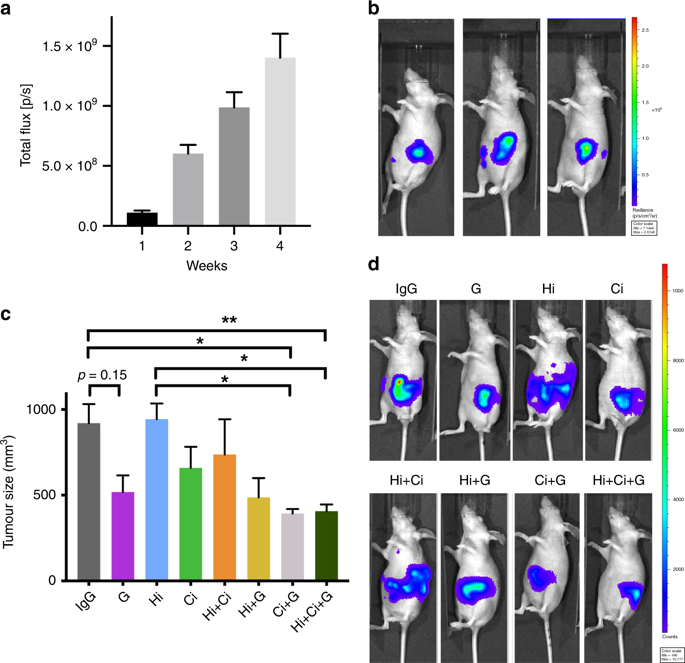当前位置:
X-MOL 学术
›
Br. J. Cancer
›
论文详情
Our official English website, www.x-mol.net, welcomes your
feedback! (Note: you will need to create a separate account there.)
Targeting the HGF/c-MET pathway in advanced pancreatic cancer: a key element of treatment that limits primary tumour growth and eliminates metastasis.
British Journal of Cancer ( IF 6.4 ) Pub Date : 2020-03-23 , DOI: 10.1038/s41416-020-0782-1 Zhihong Xu 1, 2 , Tony C Y Pang 1, 2 , Adele C Liu 1, 2 , Srinivasa P Pothula 1, 2 , Alpha Raj Mekapogu 1, 2 , Chamini J Perera 1, 2 , Takashi Murakami 3 , David Goldstein 1 , Romano C Pirola 1 , Jeremy S Wilson 1, 2 , Minoti V Apte 1, 2
British Journal of Cancer ( IF 6.4 ) Pub Date : 2020-03-23 , DOI: 10.1038/s41416-020-0782-1 Zhihong Xu 1, 2 , Tony C Y Pang 1, 2 , Adele C Liu 1, 2 , Srinivasa P Pothula 1, 2 , Alpha Raj Mekapogu 1, 2 , Chamini J Perera 1, 2 , Takashi Murakami 3 , David Goldstein 1 , Romano C Pirola 1 , Jeremy S Wilson 1, 2 , Minoti V Apte 1, 2
Affiliation

|
BACKGROUND
Stromal-tumour interactions facilitate pancreatic cancer (PC) progression. The hepatocyte growth factor (HGF)/c-MET pathway is upregulated in PC and mediates the interaction between cancer cells and stromal pancreatic stellate cells (PSCs). This study assessed the effect of HGF/c-MET inhibition plus gemcitabine (G) on the progression of advanced PC.
METHODS
Orthotopic PC was produced by implantation of luciferase-tagged human cancer cells + human PSCs into mouse pancreas. Tumours were allowed to develop without treatment for 4 weeks. Mice were then treated for 6 weeks with one of the following: IgG, G, HGF inhibitor (Hi), c-MET inhibitor (Ci), Hi + Ci, Hi + G, Ci + G, or Hi + Ci + G.
RESULTS
Bioluminescence imaging showed similar tumour sizes in all mice at the initiation of treatments. Triple therapy (Hi + Ci + G): (1) completely eliminated metastasis; (2) significantly reduced tumour size as assessed by bioluminescence and at necropsy; (3) significantly reduced proliferating cancer cell density and stem cell marker DCLK1 expression in tumours. In vitro 3D culture studies supported our in vivo findings.
CONCLUSION
Even at an advanced disease stage, a two-pronged approach, targeting (a) HGF/c-MET with relevant inhibitors and (b) cancer cells with chemotherapy, completely eliminated metastasis and significantly decreased tumour growth, suggesting that this is a promising treatment approach for PC.
中文翻译:

针对晚期胰腺癌中的HGF / c-MET途径:限制原发性肿瘤生长并消除转移的关键治疗要素。
背景技术间质-肿瘤相互作用促进胰腺癌(PC)进展。肝细胞生长因子(HGF)/ c-MET途径在PC中上调,并介导癌细胞与基质胰腺星状细胞(PSC)之间的相互作用。这项研究评估了HGF / c-MET抑制联合吉西他滨(G)对晚期PC进程的影响。方法通过将荧光素酶标记的人癌细胞+人PSCs植入小鼠胰腺中来制备原位PC。允许肿瘤未经治疗持续发展4周。然后用以下之一治疗小鼠6周:IgG,G,HGF抑制剂(Hi),c-MET抑制剂(Ci),Hi + Ci,Hi + G,Ci + G或Hi + Ci + G.结果生物发光成像显示治疗开始时所有小鼠的肿瘤大小相似。三联疗法(Hi + Ci + G):(1)彻底消除转移;(2)通过生物发光和尸体解剖显着降低了肿瘤的大小;(3)显着降低了肿瘤中增殖的癌细胞密度和干细胞标志物DCLK1的表达。体外3D培养研究支持了我们的体内发现。结论即使在疾病晚期,也可以采取两管齐下的方法,即针对(a)HGF / c-MET和相关抑制剂,以及(b)癌细胞进行化疗,可以完全消除转移并显着降低肿瘤的生长,这表明这是一种有希望的方法PC的治疗方法。体外3D培养研究支持了我们的体内发现。结论即使在疾病晚期,也可以采取两管齐下的方法,即针对(a)HGF / c-MET和相关抑制剂以及(b)癌细胞进行化疗,可以完全消除转移并显着降低肿瘤的生长,这表明这是一个有希望的方法PC的治疗方法。体外3D培养研究支持了我们的体内发现。结论即使在疾病晚期,也可以采取两管齐下的方法,即针对(a)HGF / c-MET和相关抑制剂以及(b)癌细胞进行化疗,可以完全消除转移并显着降低肿瘤的生长,这表明这是一个有希望的方法PC的治疗方法。
更新日期:2020-04-24
中文翻译:

针对晚期胰腺癌中的HGF / c-MET途径:限制原发性肿瘤生长并消除转移的关键治疗要素。
背景技术间质-肿瘤相互作用促进胰腺癌(PC)进展。肝细胞生长因子(HGF)/ c-MET途径在PC中上调,并介导癌细胞与基质胰腺星状细胞(PSC)之间的相互作用。这项研究评估了HGF / c-MET抑制联合吉西他滨(G)对晚期PC进程的影响。方法通过将荧光素酶标记的人癌细胞+人PSCs植入小鼠胰腺中来制备原位PC。允许肿瘤未经治疗持续发展4周。然后用以下之一治疗小鼠6周:IgG,G,HGF抑制剂(Hi),c-MET抑制剂(Ci),Hi + Ci,Hi + G,Ci + G或Hi + Ci + G.结果生物发光成像显示治疗开始时所有小鼠的肿瘤大小相似。三联疗法(Hi + Ci + G):(1)彻底消除转移;(2)通过生物发光和尸体解剖显着降低了肿瘤的大小;(3)显着降低了肿瘤中增殖的癌细胞密度和干细胞标志物DCLK1的表达。体外3D培养研究支持了我们的体内发现。结论即使在疾病晚期,也可以采取两管齐下的方法,即针对(a)HGF / c-MET和相关抑制剂,以及(b)癌细胞进行化疗,可以完全消除转移并显着降低肿瘤的生长,这表明这是一种有希望的方法PC的治疗方法。体外3D培养研究支持了我们的体内发现。结论即使在疾病晚期,也可以采取两管齐下的方法,即针对(a)HGF / c-MET和相关抑制剂以及(b)癌细胞进行化疗,可以完全消除转移并显着降低肿瘤的生长,这表明这是一个有希望的方法PC的治疗方法。体外3D培养研究支持了我们的体内发现。结论即使在疾病晚期,也可以采取两管齐下的方法,即针对(a)HGF / c-MET和相关抑制剂以及(b)癌细胞进行化疗,可以完全消除转移并显着降低肿瘤的生长,这表明这是一个有希望的方法PC的治疗方法。











































 京公网安备 11010802027423号
京公网安备 11010802027423号